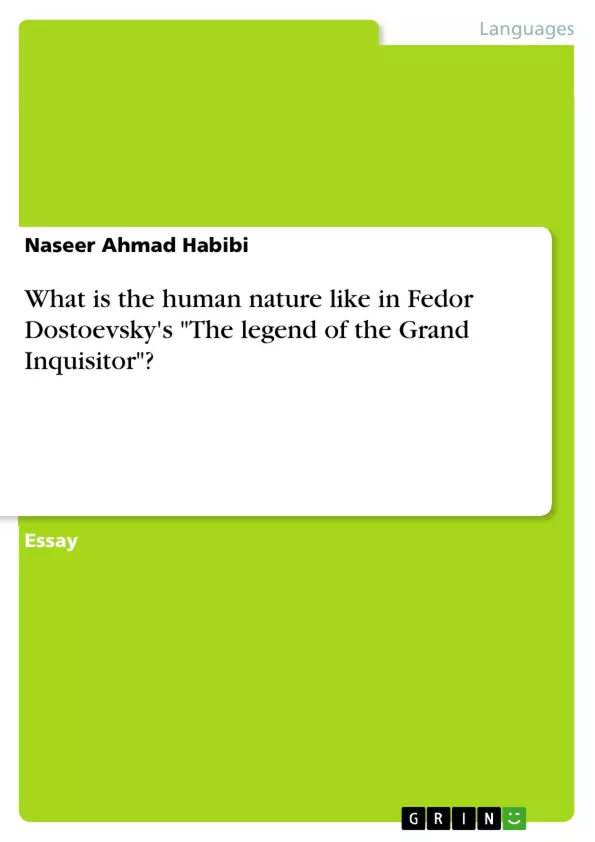The Grand Inquisitor is a significant part of the Brothers Karamazov’s novel and one of the well known passages in modern writing because of its concepts about human nature and freedom. The Grand Inquisitor thinks so low of human nature and he believes that men as whole are incapable creatures and he has doubt about human’s capability. He plays an important role in the Brother Karamazov’s novel, which has a whole chapter about him and his ideas about men. The Grand inquisitor misjudges human nature and their capability, but his ideas that human beings cannot tolerate freedom could be acceptable and satisfactory.
Inhaltsverzeichnis (Table of Contents)
- The Grand Inquisitor's Opinion on Human Nature
- The Grand Inquisitor's Experience in the Desert
- The Grand Inquisitor's Misjudgment of Human Capability
- Conclusion
Zielsetzung und Themenschwerpunkte (Objectives and Key Themes)
This essay examines the Grand Inquisitor's character from Dostoevsky's "The Brothers Karamazov" and his view on human nature. The essay seeks to understand the basis for his opinion and to explore whether his assessment of humanity's capacity for freedom and self-governance is accurate.- The Grand Inquisitor's low view of human nature.
- The role of suffering in the Grand Inquisitor's perspective.
- The debate between freedom and security.
- The contrasting perspectives of the Grand Inquisitor and Jesus Christ.
- The potential for human development and achievement.
Zusammenfassung der Kapitel (Chapter Summaries)
The essay begins by introducing the Grand Inquisitor's view of human nature as weak and incapable of self-governance. He argues that freedom leads to suffering and chaos, contrasting this with his belief that people are happiest when obedient and dependent on a strong leader. The essay then explores the Grand Inquisitor's personal experience in the desert, highlighting how his suffering may have contributed to his pessimistic outlook. The author then examines the Grand Inquisitor's claims regarding human limitations, challenging his view by citing historical examples of human achievement and potential.Schlüsselwörter (Keywords)
The essay focuses on the themes of human nature, freedom, suffering, power, and the contrasting views of the Grand Inquisitor and Jesus Christ. Key concepts include the Grand Inquisitor's pessimistic assessment of human capability, his emphasis on security over freedom, and his experience in the desert as a contributing factor to his perspective. The essay also explores the idea of human potential and the potential for progress and development.Frequently Asked Questions
What is the "Legend of the Grand Inquisitor"?
It is a famous passage from Fedor Dostoevsky's novel "The Brothers Karamazov" that explores themes of human nature, freedom, and authority.
What is the Grand Inquisitor's view of humanity?
He has a very low view of human nature, believing that people are weak, incapable of handling freedom, and prefer security and bread over liberty.
Why does the Inquisitor think freedom leads to suffering?
He argues that freedom is a burden that most humans cannot tolerate, leading to chaos and anxiety, whereas obedience to a strong leader brings happiness.
How does the Inquisitor's experience in the desert influence him?
His own suffering and asceticism in the desert led him to a pessimistic outlook, concluding that the path of Jesus Christ is only for the strong few, not the masses.
Does the essay agree with the Grand Inquisitor's assessment?
The essay challenges his view by citing historical examples of human potential and achievement, suggesting he misjudges human capability.
What is the conflict between the Inquisitor and Jesus in the story?
It represents the debate between a system of total control (security) and the Christian ideal of free will (freedom), even if that freedom includes the risk of suffering.
- Arbeit zitieren
- Naseer Ahmad Habibi (Autor:in), 2012, What is the human nature like in Fedor Dostoevsky's "The legend of the Grand Inquisitor"? , München, GRIN Verlag, https://www.grin.com/document/192904



